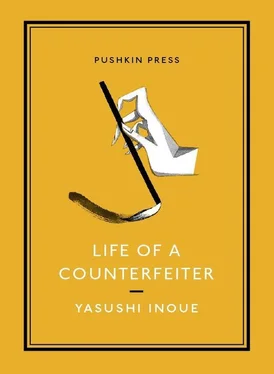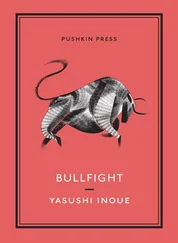I was startled to see how clinically she spoke of him. On the face of it, she no longer let herself be troubled by her long-time husband’s deplorable actions; all that belonged to the past.
“I separated from him in 1935. Between then and the time he died, he came to see me only once. That was the day the papers reported Master Keigaku’s death.”
Hōsen had come to ask her to attend Keigaku’s funeral and light a stick of incense in his place, since he himself couldn’t possibly show his face before the dead man’s spirit. At the time, Asa said, she had the impression Hōsen was asking her to go, not because he wanted to apologize to Keigaku for all the trouble he had caused, but because of the loneliness he felt now that his old friend had died.
“I think he really lost confidence after we moved up here into the mountains. Until then, he had resented Master Keigaku, though he had no reason to do so. He used to talk all kinds of rubbish when he drank, about how he could paint just as well if he set his mind to it, he had been the better painter when they were younger, he’d had more talent, but at some point after we moved up here he started talking differently. ‘It’s true,’ he’d say, ‘Keigaku is a master, he’s got amazing talent.’”
So said Asa. It seems she didn’t attend Keigaku’s funeral in Kyoto, but that was neither here nor there; what mattered to me was the image of Hōsen making his way to this village on the day he read of Keigaku’s death in the newspaper, treading the same narrow, twisty path I had taken earlier, just below the ridge, on his way to visit the wife who had abandoned him. His figure rose before my eyes with a peculiar clarity, very small, set against the magnificent fields of short bamboo that covered the mountain slope, the late autumn wind gusting over the leaves. Later, it struck me that since Keigaku had died on the day of the Doll’s Festival, on March 3, the path would still have been buried in snow; Hōsen, wearing straw sandals, perhaps, must have struggled through the drifts, and taken a very long time to get here.
At any rate, realizing that Hōsen had experienced such a day late in his life made me feel as if a single ray of white light, however faint, had pierced the dark, monochromatic vision I had created of the man, without even realizing that I was doing it.
When Asa had nothing more to say about Keigaku, I found a roundabout way, impolite as it was, to ask what had made her leave Hōsen.
And so she began: “This isn’t the sort of thing you would have any experience with, I’m sure, but the truth is it’s extremely unpleasant working with gunpowder in winter.”
The desire to leave Hōsen had come over her quite suddenly, it seems, after they moved up into the mountains and he started playing around with gunpowder. Occasionally he would ask her to help, but that wasn’t what she minded — it was how they earned their living, after all. What she detested was the way Hōsen got when he was doing that kind of work.
“When he produced his first forgeries of Keigaku’s works, he did it in secret, without telling me,” she went on. “Eventually he took to doing it out in the open, but I suppose early on even he was too ashamed to let me know, so he tried hard to keep it from me, to do it so I wouldn’t notice. When he started making fireworks it was exactly the same. This time he wasn’t doing anything wrong, though of course amateur fireworks are illegal… but still, he had no need to worry about what I would think, he could have done it openly, but instead he would wait for me to go out, or until after I went to sleep, and then set himself up at the edge of the veranda or someplace and start grinding his mortar and pestle and so on, as quietly as he could. I guess that’s why I came to hate gunpowder so much.”
Hōsen had first begun experimenting with gunpowder because the proprietor of a certain antique shop in Aioi was into making fireworks, and in the course of their dealings Hōsen had developed an interest in the art himself; by the time Asa learned about it, he was already wrapping various chemicals in paper packets of about forty grams each and igniting them to see what color flames they produced.
“Why was he so interested in fireworks, do you think?”
“You know…” Asa thought for a moment. “There was something odd about his fireworks. He was obsessed with producing a deep, rich violet color, like a Chinese bellflower — I have no idea what gave him the idea. You get a color like that when you mix Paris green, potassium chloride and powdered amber, but it’s always a little too light, not like an actual bellflower. Hōsen seems to have decided that one way or another he had to produce that exact color, just as deep, and then launch it in a chrysanthemum or something.”
The time Hōsen lost three of his fingers, he was working on a falling star and he had accidentally thrust his pick into the section where he had set the blasting powder, causing a spark that blew up the gunpowder next to him. The incident itself hadn’t necessarily stirred up any unpleasant feelings in Asa, but it inspired in her a sudden desire to leave Hōsen. She had been feeling somewhat irritated with him all along, ever since he began using gunpowder, but the explosion finally made her feel that desperate yearning to get away from him.
“Did he ever achieve that violet?” I asked.
“I don’t know,” Asa replied, sounding as if she didn’t much care one way or the other. “He never seemed happy with the color, at least while I was there.” I had the sense that talking about Hōsen had rekindled some of the love she had felt for him; her tone remained flat, her attitude cool and distant, but she never once spoke with real malice. “In the end, I think he was an unhappy man. I often think about that. I ruined my life on account of him, more or less, but I think his life was even unhappier than mine. He loved painting more than three square meals, but he strayed down the wrong path and ended his life without ever creating a single painting worth anything, and then when he started doing fireworks he lost three fingers, and that violet he was always going on about, trying so hard to make — well, he probably didn’t succeed there, either. It’s not that he was a bad man, he was just born to live an unhappy life.”
I listened to Asa’s talk for more than an hour. There was something nice about the way she spoke, as if she were watching Hōsen, never taking her eyes off him, but from a great distance — or as if she had somehow contained him, the man he had been, within her. I got the feeling that in the course of nearly three decades living with Hara Hōsen, she had matured, emotionally, in a very particular way that made her unlike other women.
“Do you know a large distillery in Wake?” I asked, remembering the story about her and Hōsen going to see the company president together.
“No, I’m afraid I don’t,” she replied right away, as though she meant it. Maybe she didn’t like talking about those days, when they were young. Or maybe, it occurred to me, the woman who had gone to the president’s house had been someone else, not her… I let the topic drop.
Leaving enough time so that I wouldn’t be late for my five o’clock appointment with the truck, I brought an end to this peculiar visit, in the course of which I had heard all kinds of details about a stranger’s life without even being offered a cup of tea, and left the house behind.
Among the various stories Hōsen’s widow had shared, I had been most intrigued by the one about his desire to launch a deep-violet chrysanthemum. At the time it hadn’t struck me all that forcefully, but it lingered with an odd insistence in my heart, and I found myself recalling it at odd moments.
Читать дальше












